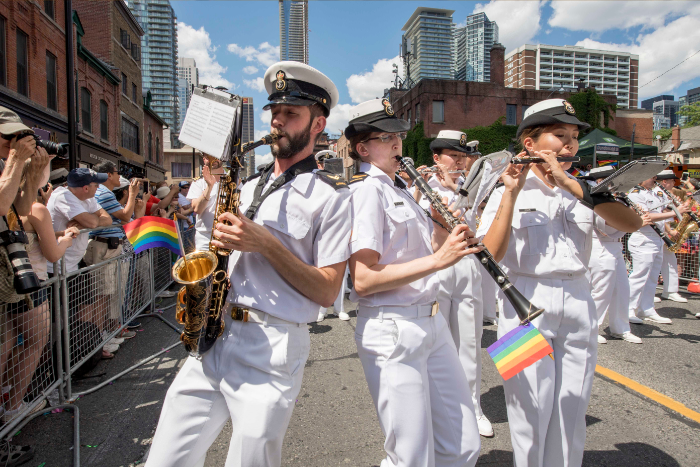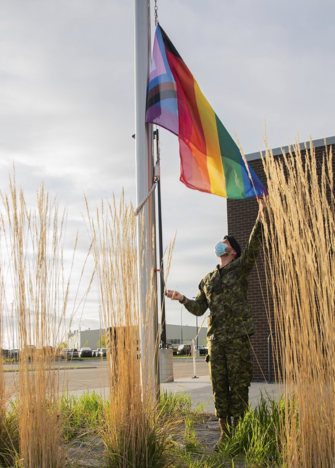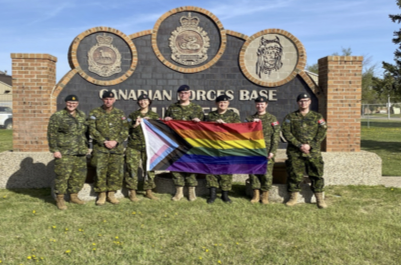2SLGBTQIA+ In The Canadian Military: 25 Years Post Anti-Homosexuality Policy
Project Summary
Between 1996 and 2010, we conducted a pan-Canadian study documenting the experiences of LGBT soldiers and their partners. Many participants spoke of devastating experiences they endured during the Armed Forces’ LGBT purge campaign, or ‘witch hunt’ era (Gouliquer, 2000).
Since then, policies have changed and several important milestones for LGBTQIA2S+ rights were reached. Canadian society has changed over the past few decades. However, little is known about the current lived realities of LGBTQIA2S+ service members and their partners. Now, nearly thirty years after CFAO 19-20 was revoked, do LGBTQIA2S+ service members and their partners still face discrimination or prejudice in their day-to-day lives? This is an important question that we want to help answer through research.
As with all of our studies, the voices of the marginalised are central to the research process. Insights from LGBTQIA2S+ soldiers and their partners are crucial to understanding current the reality. The perspectives of these groups can help guide the development of policy recommendations to support continued progress towards diversification and inclusion.
We are currently in the recruitment stage of the study so please spread the word to anyone who may be interested and don’t hesitate to contact us for more information!
Project Description
In 1992, the Canadian Forces Administrative Order (CFAO) 19-20, which prohibited ‘homosexuals’ from serving in the Canadian Armed Forces, was rescinded following a federal court of Canada ruling (Park, 1994). The Armed Forces upheld this policy of sanctioned discrimination against LGBTQIA2S+ soldiers for 23 years after the Canadian government decriminalised same-sex relations in 1969. During those 23 years, the Canadian military police’s Special Investigation Unit (SIU) hunted, investigated, interrogated, and discharged many soldiers who were ‘suspected’ or ‘guilty’ of ‘homosexuality’.
Between 1996 and 2010, we conducted a pan-Canadian study that documented the experiences of LGBT soldiers and their partners. Many participants spoke of the devastating experiences during the Armed Forces’ LGBT purge campaign, or ‘witch hunt’ era (Gouliquer, 2000).
Since that time, several important milestones for LGBTQIA2S+ rights were reached. Amongst others, these include receiving an official apology from the Canadian Government in 2017 and the settlement of a class-action lawsuit on behalf of LGBTQIA2S+ former CAF members in 2018. However, discrimination is embedded in the historical fabric of this country and many of its institutions. Despite changes in formal policies, recent survey research (see for example the reports of Cotter, 2016; and Deschamps, 2015) reveals that LGBTQIA2S+ soldiers still face discrimination and marginalisation. Therefore, in this study, our objective is to explore and document the experiences of current LGBTQAI2S+ soldiers and their families to shed light on how masculinity, heteronormativity, and patriarchy intersect in the context of the Canadian military. Insights from LGBTQIA2S+ soldiers and partners into the current reality and functioning of the Canadian Armed Forces will inform social-policy recommendations regarding inclusion and diversity.
Twenty-five years have passed since CFAO 19-20 was revoked. In brief, the purpose of the present study is to explore what the Canadian Armed Forces are like today for LGBTQIA2S+ soldiers and their families. Do they face discrimination or prejudice in their day-to-day life?
References
Cotter, A. (2016). Sexual misconduct in the Canadian Armed Forces (No. 2016001). Statistics Canada. https://www.statcan.gc.ca.ezproxy.library.dal.ca/pub/85-603-x/85-603-x2016001-eng.pdf
Deschamps, M. (2015). External review into sexual misconduct and sexual harassment in the Canadian Armed Forces [Education and awareness]. https://www.canada.ca/en/department-national-defence/corporate/reports-publications/sexual-misbehaviour/external-review-2015.html
Gouliquer, L. (2000). Negotiating sexuality: Lesbians in the Canadian military. In J. M. Stoppard, B. Miedema, & V. Anderson (Eds.), Women’s Bodies/Women’s Lives: Health, Well-being and Body Image (pp. 254–277). Sumach Press.
Park, R. (1994). Opening the Canadian Forces to gays and lesbians: An inevitable decision, but improbable configuration. In W. J. Scott & S. C. Stanley (Eds.), Gays and lesbians in the military: Issues, concerns, and contrasts (pp. 165–179). Aldine de Gruyter.
Publications
Gouliquer, L. (2012). Examining the life world of Canadian female soldiers: The effects of blatant and subtle discrimination. Canadian Psychology/Psychologie Canadienne, 53(2a), 23.
Poulin, C., & Gouliquer, L. (2012). Clandestine existences and secret research: Eliminating official discrimination in the Canadian military and going public in academia. Journal of Lesbian Studies, 16(1), 54-64.
Poulin, C.,& Gouliquer, L. (2012). The Psycho-Social Ethnography of the Commonplace (P-Sec): A semi-structured qualitative approach to feminist research. Canadian Psychology/Psychologie Canadienne, 53(2a), 272.
McCutcheon, J., Gouliquer, L., & Poulin, C. (2009). Sports and Soldiering: Examining servicewomen’s experiences with military sports. Canadian Psychology/Psychologie Canadienne, 50(2a), 41.
Moore, J. A., Poulin, C., & Gouliquer, L. (2009). Partners of Canadian lesbian soldiers: Examining the military family social support system. Canadian Psychology/Psychologie Canadienne, 50(2a), 99.
Poulin, C., Gouliquer, L.,& Moore, J. A. (2009). Discharged for Homosexuality from the Canadian military: Health Implications for Lesbians. Feminism & Psychology, 19(4), 497-516.
Gouliquer, L., & Poulin, C., & McCutcheon, J. (2008). Dissecting the menstrual cycle: A longitudinal examination of beliefs regarding menstruation and PMS. Canadian Psychology/Psychologie Canadienne, 49(2a), 41.
Moore, J. A., Poulin, C.,& Gouliquer, L. (2008). Banned from serving: The affect of anti-homosexual laws on Canadian military women. Canadian Psychology / Psychologie Canadienne, 49(2a), 270-271.
Gouliquer, L., & Poulin, C. (2005). For Better and for Worse: Psychological Demands and Structural Impacts of the Military on Gay Servicewomen and their Partners in Long-term Relationships. In D. Pawluch, B. Shaffir, & C. Miall (Eds.) Doing Ethnography: Studying Everyday Life (pp. 323-335). Toronto: Canadian Scholars’ Press. Authorship order was determined randomly.
St.Pierre, M., Poulin, C., & Gouliquer, L. (2005). Homosexual identity development in the context of the Canadian Forces: Organisational influences, schematic responses, and coping strategies. Canadian Psychology/ Psychologie canadienne, 46(2a), 200.
Gouliquer, L. (2004). Ask and tell [Book review of Officially gay: The political construction of sexuality and the US military, and Don’t ask, don’t tell: Debating the gay ban in the military]. The Women’s Review of Books, XXI (8), 22-3.
MacAulay, S., Poulin, C., Gouliquer, L., Brazier, B., Hughes, J., Brazier, B. C. S., Arseneault, R., & Theriault, L. (2004). Transition house worker’s Promises of Confidentiality: A political and practical struggle. Canadian Psychology/Psychologie canadienne, 45(2a), 136.
Poulin, C., & Gouliquer, L. (2004). Symposium: Translating Theory into Methodology: The Intersection of Sociologies and Psychologies. Canadian Psychology/ Psychologie canadienne, 45(2a), 135.
Poulin, C., Gouliquer, L., Brazier, B., Hughes, J., Brazier, B., Arseneault, R., MacAulay S., & Thériault, L. (2004). Keeping it Confidential: A struggle for Transition Houses. In M. L. Stirling, N. Nason-Clark, A. Cameron, B. Miedema (Eds.) Understanding Abuse: Partnering for Change (pp 87-110). University of Toronto Press: Toronto.
Roxborough, H., Poulin, C., & Gouliquer, L. (2004). Discriminatory Practices: Lesbian Military Members and their Partners’ Health. Canadian Psychology/Psychologie canadienne, 45(2a), 136.
Poulin, C. & Gouliquer, L. (2003). Part-time disabled lesbian passing on roller blades or PMS, Prozac, and essentializing woman’s ailments. Women & Therapy, 26(1/2), 95-108. Simultaneously published as a chapter of an edited book by Banks, M. E., & Kaschak, E. Women with Visible and Invisible Disabilities: Multiple Intersections, Multiple Issues, Multiple Therapies. Binghamton, NY: The Haworth Press). Authorship order was determined randomly.
Gouliquer, L. (2001). Introduction: Women and the Canadian Military Special Collection. Atlantis: A Women’s Studies Journal, 26, 1.
Gouliquer, L. (2001). What Gay Servicewomen can tell us about the gender order. Feminism(s) Challenge the Traditional Disciplines (MCRTW Mongraph Series No. 1). McGill University, Montréal, Québec: McGill Centre for Research on Teaching and Women.
Poulin, C. (2001). “The military is the wife and I am the mistress” Partners of Gay Service Women. Atlantis, 26(1), 65-76.
Gouliquer, L. (2000). Negotiating Sexuality: Lesbians in the Canadian Military. In B. Miedema, J. Stoppard, & V. Anderson (Eds.), Women’s Bodies/Women’s Lives: The Social and the Material (pp 254-276). Toronto: Sumach Press.
Gouliquer, L. (2000). Pandora’s Box: The Paradox of Flexibility in Today’s Workplace. Current Sociology, 48(1), 29-42.
Gouliquer, L., & Poulin, C. (1999). L’impact de la Charte des droits et libertés pour les lesbiennes dans les Forces armées canadiennes. Au-delà de l’invisibilité, 3(2), 8.
Poulin, C., & Gouliquer, L., (1999). Un bien drôle de mariage: Les lesbiennes et les forces armées canadiennes. Au-delà de l’invisibilité, 3(2), 9.
Poulin, M.B.C., Ross, L., Gouliquer, M.L., Fox, B., Thériault, L., Arseneault, R., Wuest, J., Merritt-Gray, M., Root, A., & Flowers, L. (1995). An evaluation and summary of the accumulated Monthly Reporting Form: Usage of New Brunswick Transition Houses. Fredericton, NB: Muriel McQueen Fergusson Centre for Family Violence Research.
Presentations
St. Pierre, M., Poulin, C., & Gouliquer, L. (2005). Homosexual identity development in the context of the Canadian Forces: Organisational influences, schematic responses, and coping strategies. Canadian Psychological Association (CPA) convention, Montréal, Qc.
Poulin, C., Gouliquer, L., & Harvey, J. (2004). Lesbians in the Canadian Military Identity, Self-disclosure, and Individual Adjustment. Canadian Sex Research Forum, Fredericton, NB.
Roxborough, H., Poulin, C., & Gouliquer, L. (2004). Discriminatory Practices: Lesbian Military Members and their Partners’ Health. Canadian Psychological Association (CPA) convention, St-John’s, Newfoundland.
Roxborough, H., Gouliquer, L., & Poulin, C. (2004). Military investigations for homosexuality: Psychological, physical, and social impact on lesbian servicewomen and their partners. Canadian Sex Research Forum, Fredericton, NB.
Poulin, C. (2003). Roundtable III: Experiences of foreign militaries. Don’t ask, don’t tell: 10 years later.
Poulin, C., & Gouliquer, L. (2002). Examining institutional moments and cognitive schemata in the everyday of Canadian military lesbians and their long term partners. (April 17, 2002) Department of Women Studies’ Colloquium series, University of York, United Kingdom.
Poulin, C. (2002). Lesbian partners of Canadian military women soldiers: A tug of war between two cultures. Inter-University Seminar on Armed Forces and Society: Challenge and Change for the Military Institution, the Professsion, and Leadership in the 21st Century. Kingston, Ontario
Harvey, J., Poulin, C., & Gouliquer, L. (2001). Developing a Positive Sexual Identity as a Gay Woman in the Canadian Military: An oxymoron? Canadian Lesbian and Gay Studies Association Meeting, Social Sciences and Humanities Congress, Laval, Québec.
Gouliquer, M.L., & Poulin, C. (2001). For Better and for Worse: Psychological Demands and Structural Impacts of the Military on Gay Servicewomen and their Partners in Long-term Relationships. 18th Annual Qualitative Analysis Conference: Doing ethnographies and ethnographic doings, Hamilton, Ontario.
Poulin, C. (2001). Symposium: L’histoire / History (Chair). Canadian Lesbian and Gay Studies Association Meeting, Social Sciences and Humanities Congress, Laval, Québec.
Poulin, C. (2001). The invisible partners of gay servicewomen: The process of erasing the self. Canadian Psychological Association (CPA) convention, Laval, Québec.
Poulin, C., & Gouliquer, L. (2000). Partners of Gay Service Women: “The invisible dependent.” Paper presented at the Canadian Lesbian and Gay Studies Association Meeting, Social Sciences and Humanities Congress, Edmonton, Alberta.
Poulin, M.B.C., (1999). “Closeted Military Wives”: The Untold Story of Partners of Lesbians in the Canadian Military. Paper presented at the Canadian Research Institute for the Advancement of Women (CRIAW) convention, Sudbury, Ontario.
Purpose and Importance of this Study
● Document the realities of current LGBTQIA2S+ soldiers and their partners.
● Understand the influences of military culture on the daily lives of serving LGBTQIA2S+ soldiers and their partners.
● Learn of the impacts of military laws, rules, policies, and formal and informal practices on the lives LGBTQIA2S soldiers and those of their partners.
● Compare the current reality to our previous study.
Support for this Study


This project received funding from the joint Social Sciences and Humanities Research Council & Department of National Defence Research Initiative




